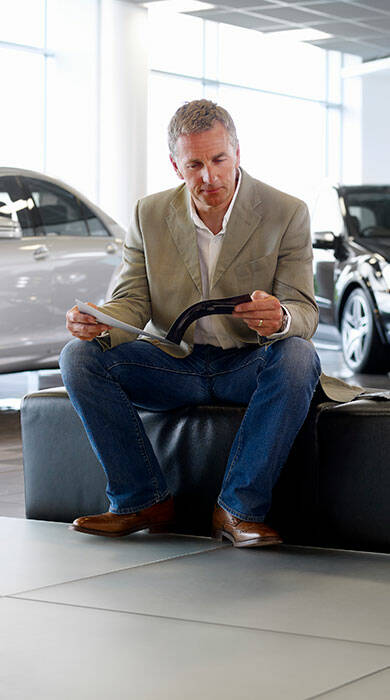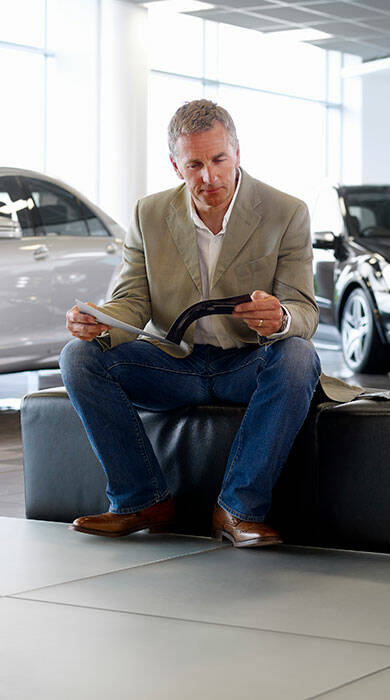With an unclear future looming over Canada’s auto retail sector, many dealers are ditching the one-dimensional business model and moving into a new era of diversification. Because if 2020 has taught them anything, it is the ability to pivot, switch gears, and plan for the unexpected. If you own an auto dealership and the property on which it operates, keep reading. We show you how to unlock your real estate portfolio's value and boost your profitability even during a pandemic.
46%
Vehicle shopping habits during the pandemic.
3X
# of people who were interested in buying a new car listed the pandemic as a direct reason for their purchase.
25M
First-time car buyers in Canada are three times more likely than experienced buyers to state they are purchasing a vehicle because of the pandemic.
The number of visits to the AutoTrader.ca website in August 2020.
Source: AutoTRADER.ca
Meet dealership disruption head-on
Disrupt or die! That’s today's critical message when it comes to navigating the rapidly evolving auto retail landscape. Thanks to COVID-19—an accelerant to online sales and digitization—dealerships are seeking drastically different business models to meet future customer demands and maintain their competitive advantage.
Compounding this gear shift is the onslaught of vehicle subscriptions, the threat of autonomous vehicles, consolidation pressures, and the subsequent operational challenges. But chief among them all is the shifting attitudes toward transportation accentuated by the global pandemic.
According to research conducted in August 2020 by online marketplace AutoTRADER.ca, the pandemic has caused a surge in demand for digital sales interactions, as people avoid public transport and ride-hailing services.
Does this mean that the desire for the physical dealership has diminished? Quite the contrary. It just means that dealerships must now rethink the meaning of showrooms and focus on the experience of specifying and driving a car. Ultimately, the endgame will blend the physical and online, with a focus on new mobility models.

Expand into small and rural areas
With swathes of Canadians moving from city to rural locations in response to changes brought about by the pandemic and the onset of more permanent remote work, dealerships can turn this paradigm shift into an advantage by staying ahead of the curve.
Toronto and Montreal saw record population decreases from July 2019 to July 2020, while Oshawa, Ontario, saw 2.1% growth—the country's fastest population growth.
Source: Statistics Canada
As shared mobility and transit systems become less attractive, car ownership interest increases, making an expansion into rural areas for auto retail a lucrative proposition, especially for dealers wanting to maximize their real estate investments.
When you factor in the fixed operations component in a dealership business model (e.g., vehicle maintenance and repair), which can account for 50% or more of a dealership's gross profits and is critical to retention and repeat sales, it becomes easier to see how the long-term play for profitability is in the rural areas.
For Michael Carmichael, President and CEO of UpAuto, this realization prompted his decision to move outside of Toronto. Believing that his operational investment in the urban auto model would not survive his career horizon, he pivoted to a market where it would.

"Auto retail in satellite centres is the key element in my business strategy. The real estate allows me to get a monthly yield on my investment versus a 20-year buy hold lease in an urban centre, where I don’t have the capital to be a material player."
- Michael Carmichael, President and CEO, UpAuto.

Do your research and due diligence
If you are considering becoming a land developer instead of strictly being an operator, determine if it fits your strategic vision and core competencies.
- Conduct due diligence and do your research into urban and rural development plans over the next 5-20 years.
- Review zoning requirements and environmental concerns (surrounding areas of cities often have wetlands or protected areas that could impact future development around your chosen land parcel, or there could be remediation concerns, hazardous land, etc.).
- Conduct research into demographic trends in the area and review immigration statistics.
- Keep abreast of legislative changes on proposed land use and development, and bear in mind the increasing power of municipalities.
- Arm yourself with as much knowledge on your potential investment before you make the offer.
Prepare operationally
Determine how you will raise capital to proceed with your new venture and the steps you need to take to clean up your balance sheets to ensure you are prepared for a major investment. Do you need to sell your operating business to fund your expansion? Is your company structure optimized for your new venture? And what team do you need to build around you to make your new venture a success?
Conduct a real estate appraisal
Calculating the property’s appraised value is a critical step in the sales process and investing in an independent appraisal as a buyer can help uncover details that are key to your strategy, instead of focusing on the goals of the seller.
Take a nuanced look at the variables surrounding location, dig into the details to ensure accurate property tax assessment, and optimize for corporate tax. These are all key factors that will have a material effect on your investment. Also, ensure that the breadth of the appraisal covers the areas critical to your investment strategy.
Structure the deal
When structuring the deal, run a sensitivity analysis to showcase outcomes for both a best and worst-case scenario. You might even decide to consider a real estate investment trust (REIT) to maximize your investment and bolster your marketplace positioning.


How can BDO help
When it comes to shifting gears in this brave new digitally disrupted world, you need a partner who can help you forge the future of automotive retail. From value ideation to value creation, our automotive retail team can help you fast-track to a more efficient and connected dealership, so you can keep the regions moving in this century and beyond.
LEARN
MORE
EXPLORE
How to supercharge automotive retail growth post-pandemic
Forward-thinking automotive retailers are looking at COVID-19 as an opportunity to pivot and revitalize their dealership portfolio. M&A is the fastest way to make that happen. By scaling your growth through acquisition and financial modelling to forecast your future, you can kickstart your return-to-growth in an economy that's revived and reimagined. Let BDO show you how. Explore our advice and act now to recover.

EXPLORE
How to supercharge automotive retail growth post-pandemic
Forward-thinking automotive retailers are looking at COVID-19 as an opportunity to pivot and revitalize their dealership portfolio. M&A is the fastest way to make that happen. By scaling your growth through acquisition and financial modelling to forecast your future, you can kickstart your return-to-growth in an economy that's revived and reimagined. Let BDO show you how. Explore our advice and act now to recover.
Source: Statistics Canada
Conduct a real estate appraisal
Calculating the property’s appraised value is a critical step in the sales process and investing in an independent appraisal as a buyer can help uncover details that are key to your strategy, instead of focusing on the goals of the seller.
Take a nuanced look at the variables surrounding location, dig into the details to ensure accurate property tax assessment, and optimize for corporate tax. These are all key factors that will have a material effect on your investment. Also, ensure that the breadth of the appraisal covers the areas critical to your investment strategy.
Structure the deal
When structuring the deal, run a sensitivity analysis to showcase outcomes for both a best and worst-case scenario. You might even decide to consider a real estate investment trust (REIT) to maximize your investment and bolster your marketplace positioning.


"Auto retail in satellite centres is the key element in my business strategy. The real estate allows me to get a monthly yield on my investment versus a 20-year buy hold lease in an urban centre, where I don’t have the capital to be a material player."
- Michael Carmichael, President and CEO, UpAuto.

How can BDO help
When it comes to shifting gears in this brave new digitally disrupted world, you need a partner who can help you forge the future of automotive retail. From value ideation to value creation, our automotive retail team can help you fast-track to a more efficient and connected dealership, so you can keep the regions moving in this century and beyond.

Do your research and due diligence
If you are considering becoming a land developer instead of strictly being an operator, determine if it fits your strategic vision and core competencies.
- Conduct due diligence and do your research into urban and rural development plans over the next 5-20 years.
- Review zoning requirements and environmental concerns (surrounding areas of cities often have wetlands or protected areas that could impact future development around your chosen land parcel, or there could be remediation concerns, hazardous land, etc.).
- Conduct research into demographic trends in the area and review immigration statistics.
- Keep abreast of legislative changes on proposed land use and development, and bear in mind the increasing power of municipalities.
- Arm yourself with as much knowledge on your potential investment before you make the offer.
Prepare operationally
Determine how you will raise capital to proceed with your new venture and the steps you need to take to clean up your balance sheets to ensure you are prepared for a major investment. Do you need to sell your operating business to fund your expansion? Is your company structure optimized for your new venture? And what team do you need to build around you to make your new venture a success?
As shared mobility and transit systems become less attractive, car ownership interest increases, making an expansion into rural areas for auto retail a lucrative proposition, especially for dealers wanting to maximize their real estate investments.
When you factor in the fixed operations component in a dealership business model (e.g., vehicle maintenance and repair), which can account for 50% or more of a dealership's gross profits and is critical to retention and repeat sales, it becomes easier to see how the long-term play for profitability is in the rural areas.
For Michael Carmichael, President and CEO of UpAuto, this realization prompted his decision to move outside of Toronto. Believing that his operational investment in the urban auto model would not survive his career horizon, he pivoted to a market where it would.

Expand into small and rural areas
With swathes of Canadians moving from city to rural locations in response to changes brought about by the pandemic and the onset of more permanent remote work, dealerships can turn this paradigm shift into an advantage by staying ahead of the curve.
Toronto and Montreal saw record population decreases from July 2019 to July 2020, while Oshawa, Ontario, saw 2.1% growth—the country's fastest population growth.
With an unclear future looming over Canada’s auto retail sector, many dealers are ditching the one-dimensional business model and moving into a new era of diversification. Because if 2020 has taught them anything, it is the ability to pivot, switch gears, and plan for the unexpected. If you own an auto dealership and the property on which it operates, keep reading. We show you how to unlock your real estate portfolio's value and boost your profitability even during a pandemic.
Source: AutoTRADER.ca
Meet dealership disruption head-on!
Disrupt or die! That’s today's critical message when it comes to navigating the rapidly evolving auto retail landscape. Thanks to COVID-19—an accelerant to online sales and digitization—dealerships are seeking drastically different business models to meet future customer demands and maintain their competitive advantage.
Compounding this gear shift is the onslaught of vehicle subscriptions, the threat of autonomous vehicles, consolidation pressures, and the subsequent operational challenges. But chief among them all is the shifting attitudes toward transportation accentuated by the global pandemic.
According to research conducted in August 2020 by online marketplace AutoTRADER.ca, the pandemic has caused a surge in demand for digital sales interactions, as people avoid public transport and ride-hailing services
Does this mean that the desire for the physical dealership has diminished? Quite the contrary. It just means that dealerships must now rethink the meaning of showrooms and focus on the experience of specifying and driving a car. Ultimately, the endgame will blend the physical and online, with a focus on new mobility models.

Vehicle shopping habits during the pandemic.
46%
# of people who were interested in buying a new car listed the pandemic as a direct reason for their purchase.
3X
First-time car buyers in Canada are three times more likely than experienced buyers to state they are purchasing a vehicle because of the pandemic.
25M
The number of visits to the AutoTrader.ca website in August 2020.
LEARN
MORE